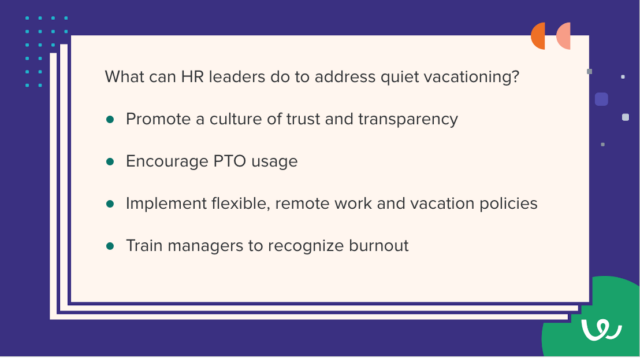Quiet vacationing hurts your business – Try this instead
The rise of quiet vacationing is rooted in the flexibility of remote work, where employees can take calls and attend meetings from anywhere—whether it’s a home office or a beachside cafe. But, what’s the problem with that?

Instead of providing true relief from burnout, this practice is a signal of deeper issues within company culture, where employees don’t feel empowered to take official time off to recharge.
For HR professionals, this growing trend offers insights into the health of their organizational culture and highlights the need to reevaluate policies around PTO and work-life balance.
Contents
Why employees opt for quiet vacationing
Employees opt for quiet vacationing for several interrelated reasons, many of which stem from a company’s culture around PTO, workload, and the pressures of modern work life.
Let’s explore them in more detail below:
Burnout and overwork: With many companies operating in a leaner environment post-pandemic, employees are often taking on more responsibilities. The fear of falling behind or not meeting expectations leads them to avoid openly requesting PTO. They want time away but don’t feel they can fully disconnect from work for fear of losing control over their workloads.
Fear of job security: Many employees, even those working in more flexible environments, fear that using PTO might be interpreted as a lack of commitment. In a competitive work environment, taking time off could be seen as “slacking,” especially in organizations where presenteeism is valued more than productivity.
Vacation guilt: Beyond job security, employees experience vacation guilt—the anxiety that taking time off places additional burdens on their colleagues. They worry that their absence may inconvenience their team or that they might return to a pile of unresolved issues, causing them to feel stressed even when they are supposed to be resting.
PTO hoarding: Studies show that a significant number of employees fail to use their allotted PTO. Whether due to overwork, fear of falling behind, or anxiety over job security, they often save their PTO for “emergencies,” leading to quiet vacationing as an attempt to rest without the psychological cost of official time off.
For HR professionals, these behaviors reflect gaps in employee well-being and point to areas where the organization may need to step in and provide more support. If employees don’t feel comfortable requesting PTO or disconnecting from work, it signals a need for policy revision and cultural change.
The hidden dangers of quiet vacationing
While quiet vacationing may seem like a creative solution for employees looking to take breaks while staying under the radar, it comes with significant downsides—both for the employee and the organization.
Worsening burnout: The inability to fully disconnect means employees aren’t getting the mental and physical rest they need to recover. Studies show that burnout impacts not only productivity but also creativity, problem-solving, and overall job satisfaction. By staying connected, even in beautiful settings, employees are not giving themselves the chance to rejuvenate, which could lead to long-term disengagement and even resignation.
Trust breakdown: Quiet vacationing inherently involves an element of deception—employees are not being transparent with their managers or colleagues. This lack of openness can break down trust in teams. If managers discover an employee has been working remotely from a vacation spot without approval, it could lead to disciplinary action, negatively affecting the relationship between the employee and the employer.
Legal and compliance risks: In some cases, working from unapproved locations can pose health and safety risks, especially if the employee isn’t equipped with the necessary tools or environment to work safely. Moreover, depending on labor laws and company policies, unauthorized remote work may have compliance implications, particularly in industries with strict regulations on data security, location-based work, or insurance policies.
For HR professionals, these risks should not be taken lightly. The practice of quiet vacationing highlights systemic issues that need to be addressed at the policy level.
Rather than punishing employees who engage in this behavior, HR leaders must explore the underlying causes and create proactive solutions.
What does quiet vacationing reveal about workplace culture?
Quiet vacationing serves as a red flag for deeper issues within workplace culture. When employees feel the need to hide their time off, it signals a lack of trust and a toxic work environment where people feel overworked, undervalued, or unable to take the necessary time to recharge.
Toxicity and mistrust: If an employee feels they cannot be honest about their need for a break, the company’s work-life balance is likely skewed toward overwork. The “always-on” mentality often reflects a lack of support, pushing employees to find clandestine ways to get the rest they need. HR professionals should look beyond the individual behavior of quiet vacationing and instead assess the larger cultural issues that might be contributing to the rise of this practice.
Ineffective work-life balance policies: The fact that employees are turning to quiet vacationing instead of openly taking PTO shows that many workplaces are not fully supporting true work-life balance. Some organizations may promote flexible work or unlimited PTO on paper but fail to foster an environment where employees feel comfortable utilizing these benefits. In some cases, employees feel that taking PTO may even hurt their career growth or job security. This discrepancy between policy and practice can erode trust within the organization.
Burnout and retention risks: Quiet vacationing is also a symptom of growing burnout. Employees who feel overworked or undervalued are more likely to engage in behaviors that help them survive but not thrive. Without meaningful breaks and the ability to fully disconnect from work, employees become disengaged, unproductive, and more likely to leave the organization.
For HR professionals, quiet vacationing provides a clear call to action: it’s time to review existing policies, listen to employee concerns, and create a healthier culture that values employee well-being.
What can HR leaders do to address quiet vacationing?
HR leaders play a crucial role in mitigating the effects of quiet vacationing and promoting a healthier workplace culture. Here are several actionable steps HR can take:

Promote a culture of trust and transparency: Encourage open conversations about time off and work-life balance. Let employees know that it’s okay to take breaks and that PTO is a benefit meant to be used. This can be done through regular internal communications, leadership messaging, and the example set by managers who openly take their own PTO.
Encourage PTO usage: Make it clear that PTO is a right, not a luxury. Reward employees for taking time off and highlight the benefits of fully disconnecting. For instance, consider implementing “PTO refresh weeks” where employees are encouraged to take at least a few days off. You could also track PTO usage and engage in one-on-one conversations with employees who aren’t taking their time off to understand their concerns.
Implement flexible, clear remote work and vacation policies: While hybrid work environments allow for flexibility, it’s crucial to have clear boundaries. HR should set policies that allow employees to work remotely from different locations while also distinguishing between remote work and vacation time. Establish formal channels for requesting time off, and ensure that these processes are straightforward, supportive, and non-punitive.
Train managers to recognize burnout: Managers need to be able to spot signs of burnout early on and encourage their teams to take time off before reaching the breaking point. Provide management training on how to have open discussions about mental health, stress, and work-life balance, and ensure they are equipped with resources to support their teams effectively.
Solutions to prevent quiet vacationing
To prevent quiet vacationing from becoming a widespread issue, HR leaders should focus on proactive solutions that improve employee well-being and ensure workers feel comfortable openly taking time off:
Encourage full disconnect: One of the biggest reasons quiet vacationing exists is because employees don’t feel like they can fully disconnect from work. HR can encourage full disconnection during PTO by setting clear boundaries on communication, reinforcing “no contact” policies, and providing employees with resources to hand off tasks to their colleagues while they’re out.
Offer mental health resources: Employees who are overworked or anxious about job security may be hesitant to ask for time off. Offering resources like counseling services, stress management tools, and mental health days can help create a culture that supports overall well-being. Ensure employees know these resources are available, and regularly promote them.
Lead by example: Leadership has a critical role in setting the tone for how PTO is viewed in the workplace. HR should work with company leaders and managers to ensure they are leading by example. When managers take time off and disconnect fully, it signals to their teams that it’s okay to do the same. This reduces the stigma around PTO and makes employees more likely to follow suit.
Turning quiet vacationing into a positive shift
Quiet vacationing reflects deeper challenges in workplace culture, but it can also serve as an opportunity for HR leaders to make positive changes. By addressing the root causes—such as burnout, lack of trust, and insufficient work-life balance policies—organizations can create a culture that values transparency, well-being, and true rest.
Ultimately, quiet vacationing is not a sustainable solution for employees or employers. Instead, fostering an open, supportive environment where PTO is encouraged and respected can help prevent burnout, increase productivity, and build trust across the organization. HR professionals have the power to turn this trend into a catalyst for a healthier, more balanced work culture.
Frequently asked questions
- Why are employees engaging in quiet vacationing?
- Quiet vacationing happens when employees don't feel comfortable taking official time off. Burnout, fear of job security, and vacation guilt drive them to work remotely during vacations. They feel overburdened and afraid to fully disconnect, signaling a larger problem with company culture and work-life balance.
- What are the dangers of quiet vacationing?
- Quiet vacationing worsens burnout because employees don't get proper rest. It also undermines trust in teams and can lead to compliance issues if employees work from unapproved locations. These risks impact both the employee’s well-being and the organization’s long-term productivity and morale.
- How can HR leaders address quiet vacationing?
- HR can combat quiet vacationing by fostering a culture of transparency and trust. This involves promoting PTO usage, creating clear policies that distinguish between remote work and vacation, and encouraging managers to lead by example. Addressing burnout early on and improving communication around time off is essential for cultural change.
- What risks does quiet vacationing pose to employees and companies?
- Quiet vacationing worsens burnout, as employees don’t get the rest they need, reducing productivity and increasing the likelihood of disengagement. It also fosters mistrust between employees and managers. Furthermore, it can introduce legal and compliance risks if employees work from unapproved or unsafe locations, creating additional liability for businesses.
- How can companies prevent quiet vacationing?
- Organizations should encourage employees to fully disconnect during PTO and offer support for mental health and stress management. HR can implement policies that make taking time off simple and non-punitive, while leadership should set the example by taking their own time off to reduce the stigma around PTO usage.




